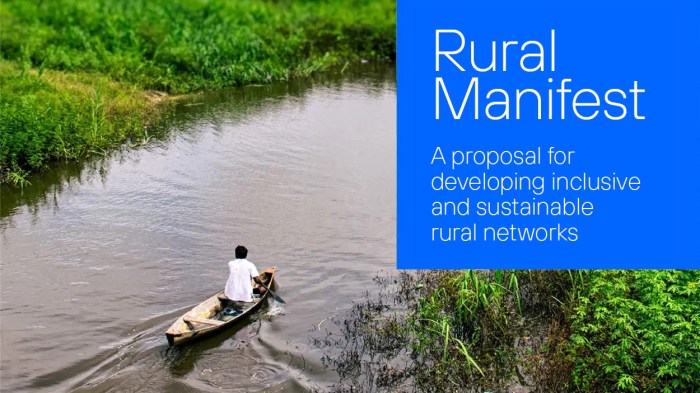A high-capacity, resilient telecommunications network with extensive coverage is indispensable to achieve the digital transformation of societies and economies and improve the quality of life of citizens. The digital divide and lack of internet access is a barrier to economic growth and social development. Connecting the unconnected must be a priority and a global objective of public and regulatory policies.
Rural Manifest
This document contains Telefónica’s proposals to fully connect rural areas in Latin America, joining public and private efforts under a collaborative approach, and focusing on a new model that revolves around three main axes: innovation, cooperation and sustainability.
To achieve this, it is key to reassess current public policies and contribute to the development of a specific regulatory framework for rural areas around five elements: foster innovation, encourage collaboration, free up resources for investment, facilitate the deployment of infrastructure, reduce or eliminate technical barriers and ensure technological neutrality.
You can download our Rural Manifest below.

Europe and Latin America will not achieve their ambitious connectivity goals without a change in policy and regulatory strategy to attract the investment needed to deploy high capacity networks. Therefore, new forms of collaboration and business models that allow for more efficient investment schemes need to be encouraged. Voluntary network sharing agreements and innovative forms of cooperation between different actors (development banks, digital service providers…) are a great opportunity.
However, it is not enough to offer more connectivity; the capacity of existing networks needs to be upgraded. Network building technologies that can evolve in the future and allow for continuous innovation of the network itself must be promoted, as well as encouraging the switch-off of legacy networks as an opportunity to improve their energy efficiency and contribute to the decarbonisation of the economy.
At Telefónica, we are implementing innovative partnerships for the deployment of telecommunications networks. In Peru, through Internet para Todos (IpT) project, we are deploying a neutral wholesale mobile network in rural areas. In Brazil, the partnership scheme focuses on the creation of a wholesale operator for FTTH deployment in urban areas and in Germany, the agreement with Allianz is aimed at fibre deployment in rural areas. However, it is not enough to offer more connectivity; the capacity of existing networks needs to be upgraded. Network building technologies that can evolve in the future and allow for continuous innovation of the network itself must be promoted, as well as encouraging the switch-off of legacy networks as an opportunity to improve their energy efficiency and contribute to the decarbonisation of the economy.
The goal of connecting everyone must also remove the barriers that make the business model of network deployment in remote and rural unserved areas (white spots) unviable.
Aspects such as spectrum cost reduction, taxation, greater regulatory flexibility, facilitating the deployment of open and shared networks can contribute to making deployment in rural areas economically viable. This should be complemented by the allocation of public funds as part of social cohesion policy.
Collaboration must be the basis for developing public policies and regulation that strongly support investments to connect the connected and leave no one behind.


